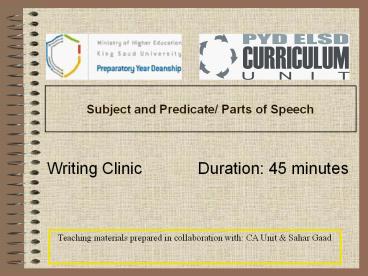Subject%20and%20Predicate/%20Parts%20of%20Speech - PowerPoint PPT Presentation
Title:
Subject%20and%20Predicate/%20Parts%20of%20Speech
Description:
Title: WHAT IS A SENTENCE? Author: grimes Last modified by: Amphie Santos Created Date: 8/10/2004 1:24:32 PM Document presentation format: On-screen Show (4:3) – PowerPoint PPT presentation
Number of Views:206
Avg rating:3.0/5.0
Title: Subject%20and%20Predicate/%20Parts%20of%20Speech
1
Subject and Predicate/ Parts of Speech
- Writing Clinic Duration 45 minutes
Teaching materials prepared in collaboration
with CA Unit Sahar Gaad
2
WHAT IS A SENTENCE?
- TODAYS LESSON WILL EXPLAIN
- WHAT IS REQUIRED IN EVERY SENTENCE?
- WHAT IS A SUBJECT?
- WHAT IS A PREDICATE?
3
WHAT IS REQUIRED IN EVERY SENTENCE?
- Not every group of words is a sentence. To be a
sentence, a group of words must make a complete
thought AND contain - SUBJECT
- PREDICATE
4
SUBJECTS
- Simple Subject
- Usually only one word.
- Always a noun or pronoun.
- Tells what or who the sentence is about.
- Complete Subject
- Can be several words or only one word.
- Always contains a noun or pronoun.
- Always includes the simple subject.
5
SIMPLE PREDICATE
- Always a verb. (A verb is a word that tells what
the subject is doing or being.) There are two
kinds of verbs - Action verbs run, jump, sit, sleep.
- Being verbs am, is, was, seem.
6
COMPLETE PREDICATE
- Always contains the simple predicate (a verb)
- Can be one word or several words.
- The sunset is beautiful.
7
BUILDING SENTENCES
- William writes poems.
- My friend William writes poems about nature.
- My friend William wrote a poem about flowers and
trees. - My kind, talented friend William wrote the poem
The Earths Paintings which is about the beauty
of nature.
8
BUILDING YOUR OWN SENTENCES
- Write a two-word sentence that contains ONLY a
simple subject and simple predicate. - To that sentence, add one or more words to
describe the subject. - Keep that sentence and add one or more words to
the predicate. - Add more words or phrases to that sentence to
make it longer and more descriptive. - Underline the simple subject and simple predicate
in each sentence.
9
EXAMPLE SENTENCES
- Dogs barked.
- Those big dogs barked.
- Those big dogs barked loudly.
- Those big dogs in the pen next door barked loudly
all night.
10
EXAMPLE SENTENCES
- Dogs barked.
- Those big dogs barked.
- Those big dogs barked loudly.
- Those big dogs in the pen next door barked loudly
all night.
11
WHAT IS A SENTENCE?
- What must it do?
- What must it contain?
- What is a simple subject? A complete subject?
- What is a simple predicate? A complete predicate?
12
QUICK PRACTICE
13
ANSWER KEY
14
QUICK PRACTICE 2
- Direction Complete the following subject and
predicate to make complete sentences. - The students
- are watching their students reading their books
15
PARTS OF SPEECH
A noun is the name of a person, place, thing, or
idea People farmer, mechanic, father,
Professor Haskins, accountant, Marcia Places
ocean, Canada, porch, Spain, classroom Things
scissors, giraffe, pen, jet ski, fridge,
skateboard, picture, pencil Ideas love,
inspiration, courage, anxiety, eagerness,
happiness, kindness
16
PARTS OF SPEECH
- An adjective modifies (qualifies or limits the
meaning of ) a noun or a pronoun. It answers the
questions, What kind? Which one(s)? How many? How
much? - Example
- Carrie read an interesting story. (What kind of
story?) - The recent article has that information. (Which
article?) - Kent owns those surfboards. (Which surfboards?)
- Wendy paid fifty dollars for the jacket. (How
many dollars?) - Much space was devoted to her artwork. (How much
space?)
17
PARTS OF SPEECH
- A verb tells what action (often a physical
action) a subject is performing, has performed,
or will perform. - Example
- My father delivers packages to department stores
each day. - Louie won a perfect game last night.
- Suzanne skated across the rink in Central Park.
- Turn at the next corner, Noel.
- Oscar will help Yousuf with the project.
18
PARTS OF SPEECH
An adverb is a word that modifies (qualifies or
limits) a verb, an adjective, or another
adverb. ? Many adverbs end in - ly. ? Adverbs
answer any of these four questions Where? When?
How? To what extent? ? Adverbs make writing more
specific and more exact. ? Here are some adverbs
that do not end in -ly
19
QUICK PRACTICE 3
- Direction Write complete sentences using the
following parts of speech. - shop assistant (noun)
- disgusting (adjective)
- earn (verb)
- immediately (adverb)






























